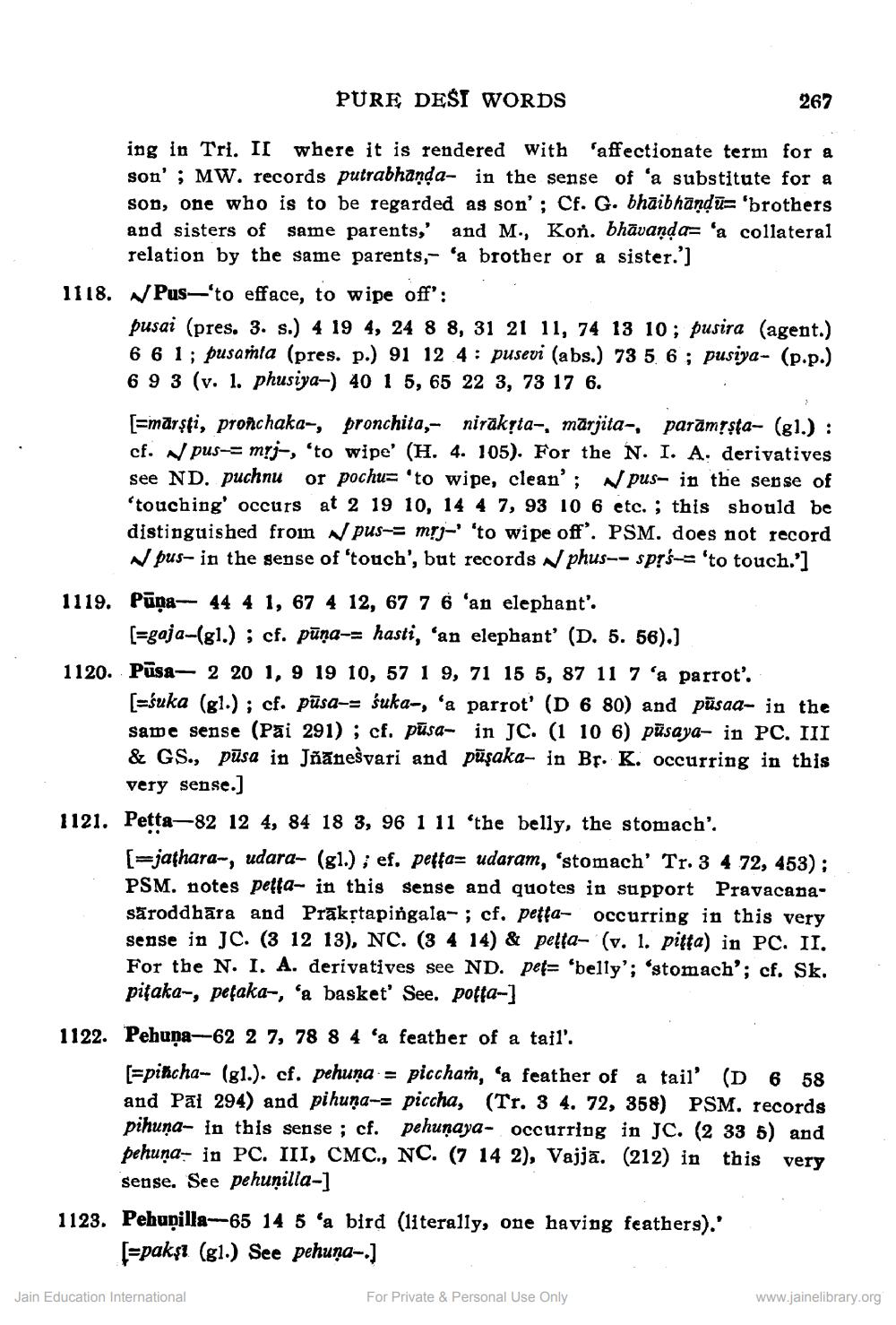________________
PURE DESI WORDS
ing in Tri. II where it is rendered with 'affectionate term for a son'; MW. records putrabhanda- in the sense of 'a substitute for a son, one who is to be regarded as son'; Cf. G. bhaibhandu 'brothers and sisters of same parents,' and M., Kon. bhavanḍa= 'a collateral relation by the same parents, 'a brother or a sister.']
1118. Pus-'to efface, to wipe off":
pusai (pres. 3. s.) 4 19 4, 24 8 8, 31 21 11, 74 13 10; pusira (agent.) 6 6 1; pusamta (pres. p.) 91 12 4 pusevi (abs.) 73 5 6; pusiya- (p.p.) 6 9 3 (v. 1. phusiya-) 40 1 5, 65 22 3, 73 17 6.
paramṛṣṭa- (gl.):
[=marşti, pronchaka-, pronchita,- nirākṛta-, mārjita-, cf. pus mrj-, 'to wipe' (H. 4. 105). For the N. I. A. derivatives see ND. puchnu or pochu 'to wipe, clean'; pus- in the sense of 'touching' occurs at 2 19 10, 14 4 7, 93 10 6 etc.; this should be distinguished from pus mrj-' 'to wipe off'. PSM. does not record pus- in the sense of 'touch', but records /phus-- spṛś- 'to touch.']
1119. Pūna 44 4 1, 67 4 12, 67 7 6 'an elephant'.
[=gaja-(gl.); cf. pūņa- hasti, 'an elephant' (D. 5. 56).]
1120. Pusa- 2 20 1, 9 19 10, 57 1 9, 71 15 5, 87 11 7 'a parrot'. [=suka (gl.); cf. pusa- suka-, 'a parrot' (D 6 80) and pusaa- in the same sense (Pai 291); cf. pūsa- in JC. (1 106) pūsaya- in PC. III & GS., pusa in Jñanesvari and puşaka- in Br. K. occurring in this very sense.]
267
1121. Petta-82 12 4, 84 18 3, 96 1 11 'the belly, the stomach'.
[=jathara-, udara- (gl.); ef. petta= udaram, 'stomach' Tr. 3 4 72, 453); PSM. notes pelta- in this sense and quotes in support Pravacanasäroddhara and Prakṛtapingala-; cf. petta- occurring in this very sense in JC. (3 12 13), NC. (3 4 14) & petta (v. 1. pitta) in PC. II. For the N. I. A. derivatives see ND. pet 'belly'; 'stomach'; cf. Sk. pitaka-, petaka-, 'a basket' See. potta-]
1122. Pehuna-62 2 7, 78 8 4 'a feather of a tail'.
[=pincha (gl.). cf. pehuna piccham, 'a feather of a tail' (D 6 58 and Pai 294) and pihuna- piccha, (Tr. 3 4. 72, 358) PSM. records pihuna- in this sense; cf. pehunaya- occurring in JC. (2 33 5) and pehuna in PC. III, CMC., NC. (7 14 2), Vajjā. (212) in this very sense. See pehunilla-]
=
1123. Pehupilla-65 14 5 'a bird (literally, one having feathers).'
[=paksi (gl.) See pehuna-.]
Jain Education International
For Private & Personal Use Only
www.jainelibrary.org




